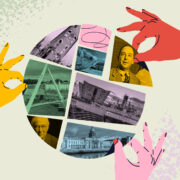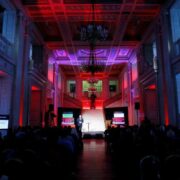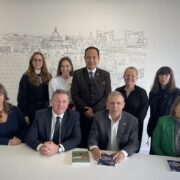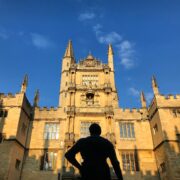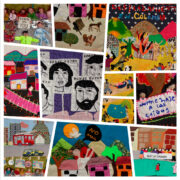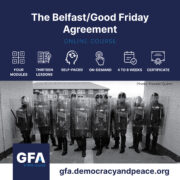Cultural Diplomacy and the Art of Soft Power
Cultural Diplomacy and the Art of Soft Power – The role of art and artists in shaping Ireland’s international image – North and South
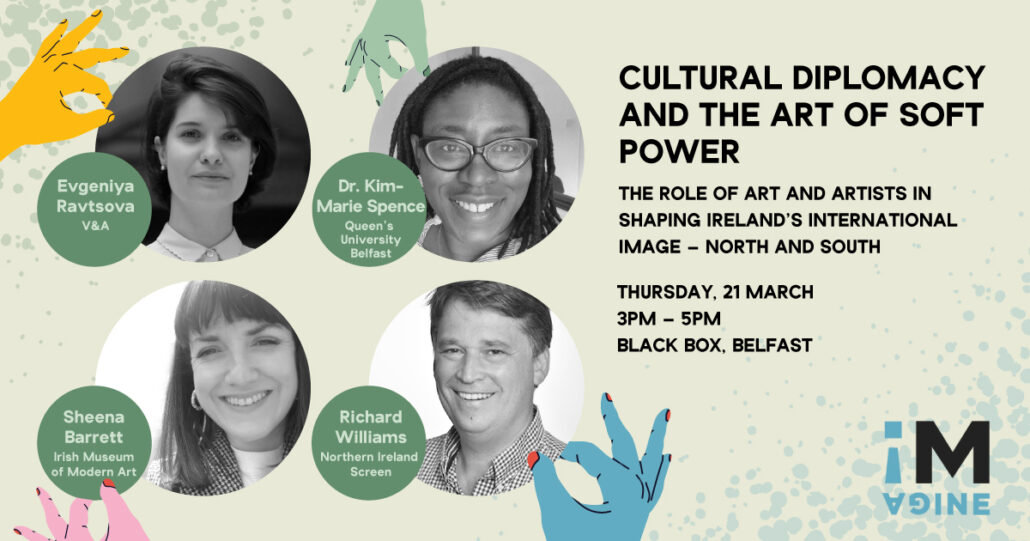
What is the role of cultural diplomacy in our ever-increasing polarised and divided world? How can we foster a better understanding between cultures and nations? How can cultural diplomacy pave the way to the wider cooperation and dialogue?
During this seminar we will examine the role of cultural diplomacy, learn how we can foster an effective cultural dialogue, and examine the role of art and artists in shaping the island of Ireland’s image (North and South) in the international context.
The seminar will feature a keynote address from Evgeniya Ravtsova, International Programmes Manager at the Victoria and Albert Museum, on the Art of Soft Power, followed by a panel discussion with Sheena Barrett, Head of Research and Learning, Irish Museum of Modern Art; Dr. Kim-Marie Spence, Lecturer, Arts Management and Cultural Policy Queen’s University Belfast; and Richard Williams, Chief Executive, Northern Ireland Screen.
This event is part of Imagine! Belfast.
Event Details
Thursday, 21 March | 3pm – 5pm
The Black Box, 18–22 Hill Street, Belfast
Free Admission
Book your tickets at: https://imaginebelfast.com/event/cultural-diplomacy-and-the-art-of-soft-power/
TEDxStormont set for return to Parliament Buildings with stellar line up of speakers
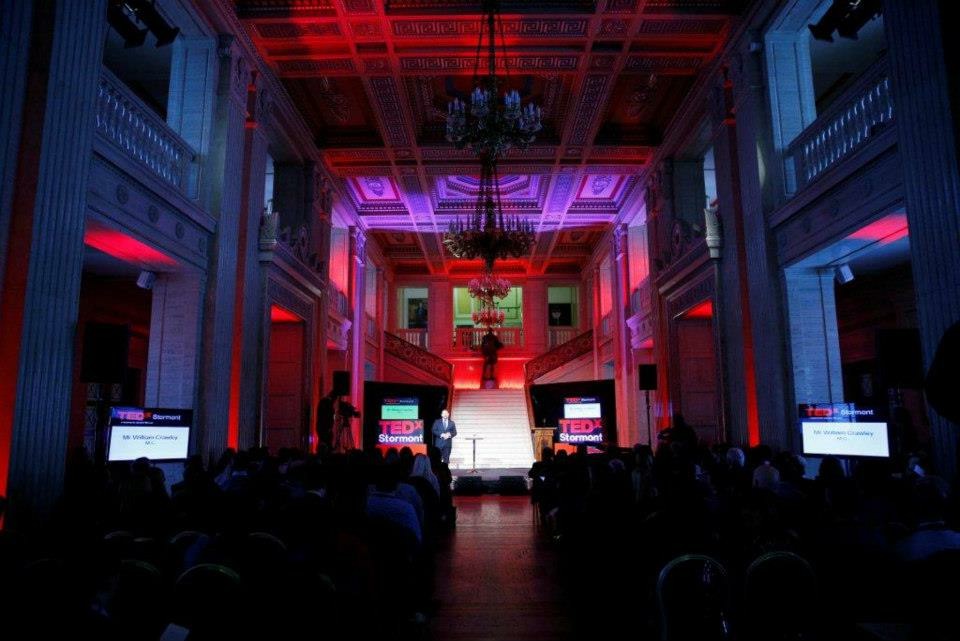
TEDxStormont is gearing up for its return to Parliament Buildings on Saturday 20 January with an exceptional lineup of speakers featuring one of Northern Ireland’s best-known columnists and commentators Alex Kane, TikTok piano sensation and songwriter Jamie Duffy, and accomplished A-Level student and Syrian refugee Romav Ali.
The daylong event, supported by Biopax, Camlin Group and Coca-Cola and compered by presenter and broadcaster Sarah Travers, is expected to see 200 guests fill the Great Hall at Parliament Buildings. This year’s speakers will deliver their talks on the theme of ‘Restore’.
As the driving force behind Northern Ireland’s screen industry and which produces award-winning graduates for one of the fastest growing sectors of the economy, the Ulster Screen Academy from Ulster University is also on board as TEDxStormont’s production partner.
Standing on the iconic red dot, speakers will share their innovative ideas, inspiring stories, and thought-provoking discussions on how to rejuvenate communities and rekindle hope for a more sustainable and harmonious future.
Beginning as a four-day conference in California, TED and the TEDx programme has grown to support world-changing ideas with multiple initiatives like TEDxStormont, which since 2013 has organised over 20 events and meet-ups, including TEDxStormont, TEDxStormont Women, Salons, City 2.0, TED Global viewing parties, TED Circles, Countdown, and a week-long virtual Summer Camp.
Across the span of a decade, TEDxStormont has hosted some of the most acclaimed speakers including Gary Lightbody of Snow Patrol, Lyra McKee, Ana Matronic of the Scissor Sisters, and astrophysicist Jocelyn Bell Burnell.
The event will bring individuals from an array of backgrounds such as academia, journalism, music, business, and sport.
TEDxStormont speakers being announced today include:
Alex Kane – Political Columnist and Commentator
Celtic Psalms – Music Group
Ed Lindsay – Custodian and Owner of Finnebrogue Woods
Jamie Duffy – Musician and Songwriter
Jane Shaw – Therapist, Writer and Educator
John Martin – Head of Policy and Advocacy at RSPB NI
Justin Lowry – Antique Dealer and Reuse Revolution Enthusiast
Kiran Young Wimberly – Presbyterian Minister and Co-founder of Celtic Pilgrims
Matthew Taylor – Mental Health Campaigner
Michael Boyd – Sport, Business and Human Rights Specialist
Michael O’Sullivan – Economist and Author
Paula Kennedy Garcia – Customer Experience Thought Leader, Innovator and Strategist
Romav Ali – A-Level Student
Sinead Sharkey-Steenson – Leadership Career Coach
Susan Lagdon – Lecturer in Psychology (Mental Health)
Declan Keeney – Professor of Screen Technologies & Innovation
Heidi McIlvenny – Marine Specialist
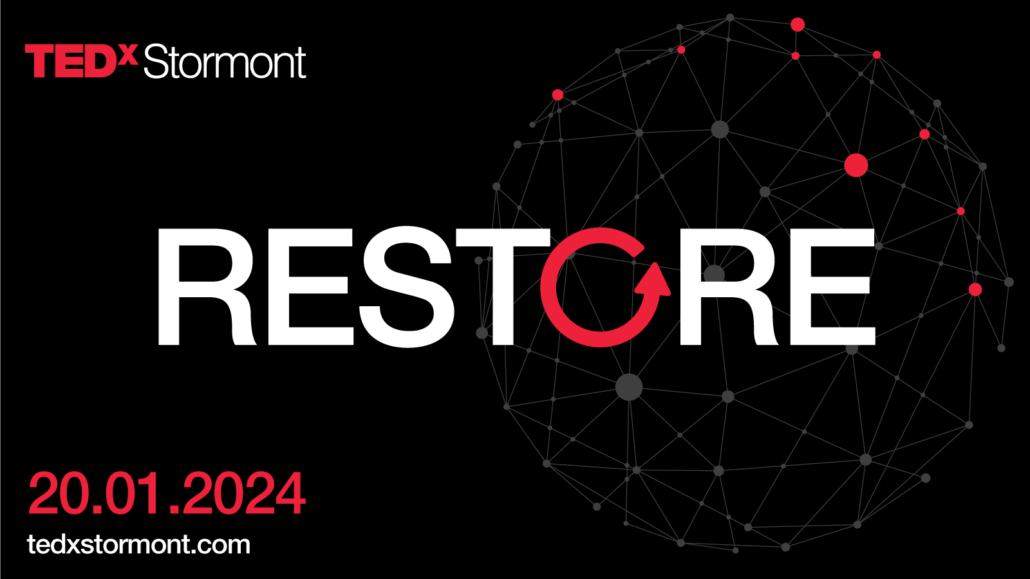
Dr Terry Cross OBE, Chair, Biopax, said:
“At the heart of progress lies original ideas and inspiring people which together, shape our future. It is so important to provide a platform for those who pave the way for positive change. This is why we are proud at Biopax to be supporting an endeavour like TEDxStormont which works towards turning visionary ideas into a sustainable reality”
Peter Cunningham, Chief Executive, Camlin Group, added:
“We are so pleased at Camlin to be supporting TEDxStormont this year. As we embark on a new year which always brings with it fresh opportunities and new challenges, there is no better time to come together and hear innovative ideas for change and progress from inspirational people. At Camlin, we believe in the power of working together, alongside our company purpose to ‘engineer better futures’, a value which TEDxStormont embodies”.
Eva Grosman, Curator of TEDxStormont 2024 said:
“We are excited to be welcoming some of the most inspiring and esteemed individuals from various backgrounds at this year’s TEDxStormont. This year’s event will allow us to engage with speakers who are leading the change in restoring ecosystems, relationships, and societal well-being. Taking place in the historic backdrop of the Great Hall at Stormont, together we will have the opportunity to learn, adapt and empower ourselves to restore balance in our lives and the world around us”.
Tickets and more information are available at www.tedxstormont.com.
Colombian delegation visits London and Belfast
The Centre for Democracy and Peace Building had the pleasure of working closely with the Colombian Embassy to the United Kingdom in November.
The week of engagements began with co-organising a discussion in the House of Lords with CDPB emeritus chairman and host, Lord Alderdice, in conversation HE Ambassador Roy Barreras and the Women Weavers of Mampuján, exploring lessons of the Irish and Colombian peace processes, reconciliation, and the art of healing.
The Ambassador was a plenipotentiary negotiator on behalf of the state in the peace process with the former FARC guerrillas and spent three years negotiating that process, achieving the signing of the Peace Agreement in 2016. The women are part of a group of displaced women from the community of Mampuján in the Montes de Maria region of Colombia which was destroyed from the conflict. Drawing on Afro-Caribbean storytelling and local textile art traditions, the group depict the atrocities they had suffered as a community and document their displacement, a central component to their process of healing and re-building.
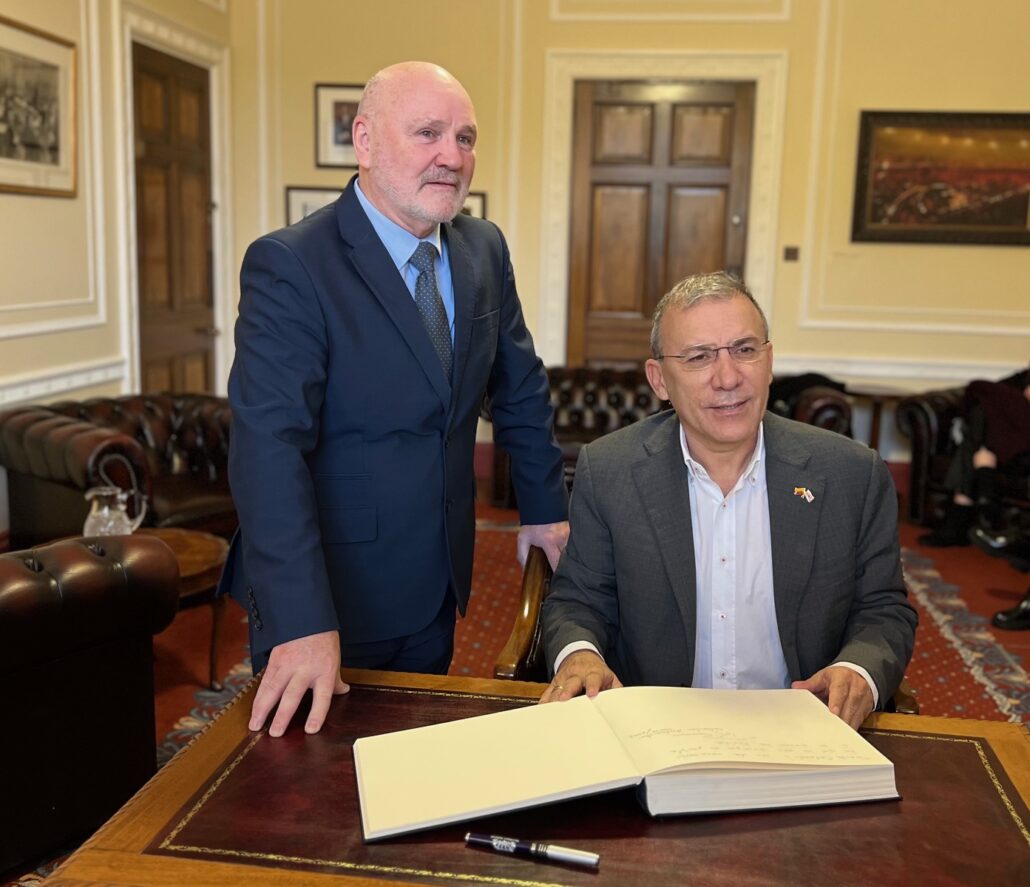
Later in the week CDPB had the honour of hosting the Ambassador and his delegation in Belfast for a day full of engagements and fruitful conversations concerning the shared learnings from the Colombian and NI peace processes. The Ambassador was welcomed by the Speaker of the Assembly, Alex Maskey, at Stormont before engaging with a delegation of political leaders from Northern Ireland. Later in the day he met with members of the British Council and received a VIP tour of the award-winning Titanic Belfast.
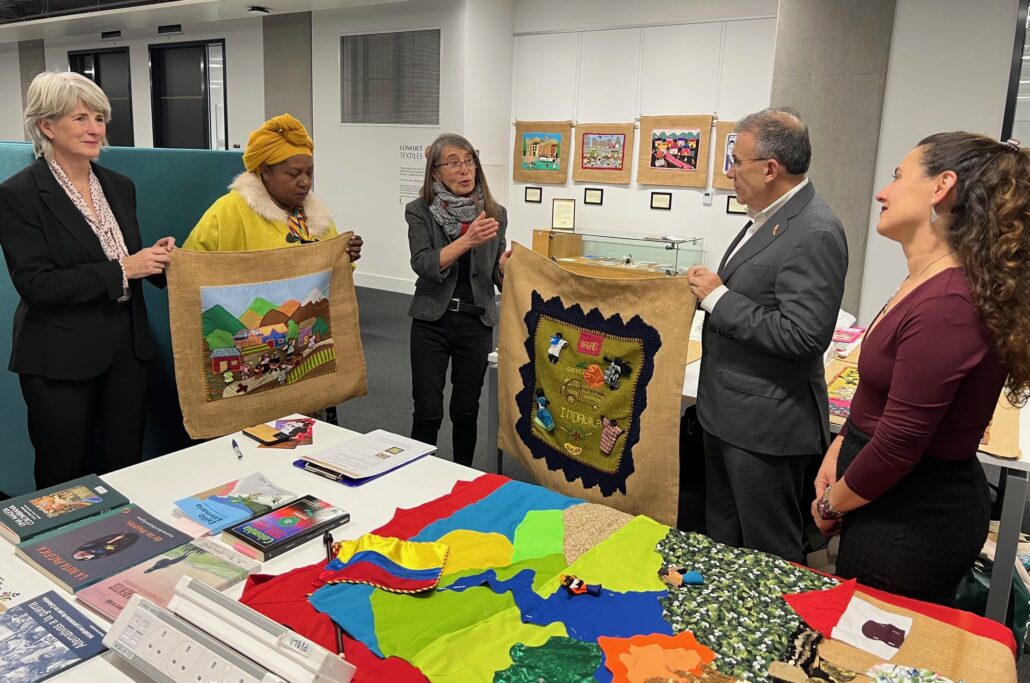
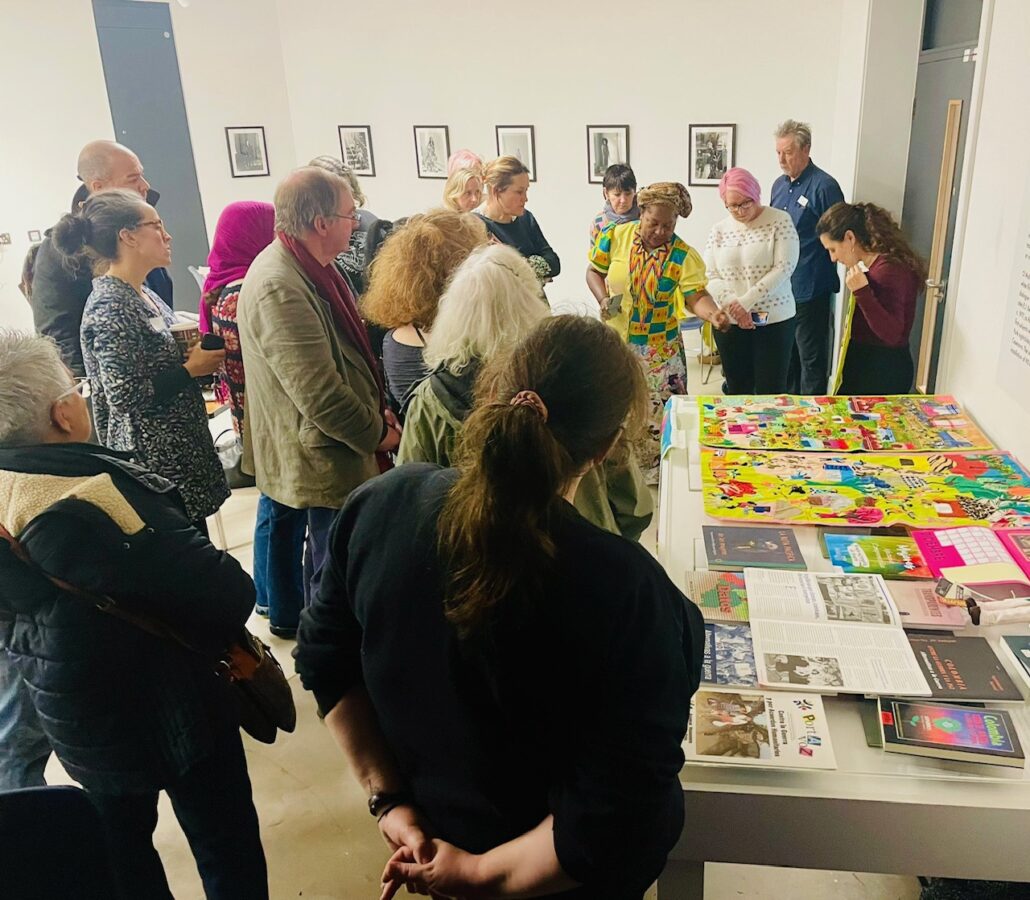
The Women Weavers of Mampuján engaged with various individuals from across Northern Ireland in a workshop at Ulster University, Stitching our Stories: Displacement, Healing, New Possibilities, in partnership with Conflict Textiles. It was a truly powerful day with many friendships made and experiences shared. The Ambassador was welcomed to Ulster University later in the day by Vice Chancellor Paul Bartholomew to open the new Conflict Textiles exhibit and gave a lecture on the vital role of empathy in the process of reconciliation.
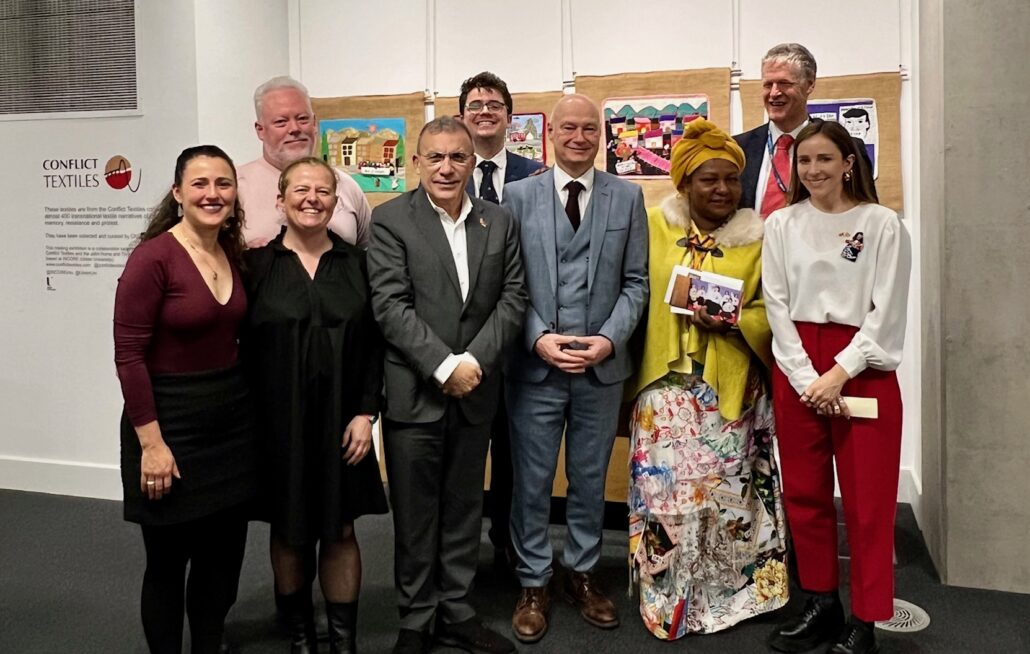
A special thanks to the Northern Ireland Community Relations Council for their vital support in making the Stitching our Stories workshop possible, Conflict Textiles, as well as Ulster University and Ulster Presents, especially Professor Duncan Morrow, Professor Brandon Hamber, and Cian Smyth.
Queen Jadwiga Fellowship in Polish Studies
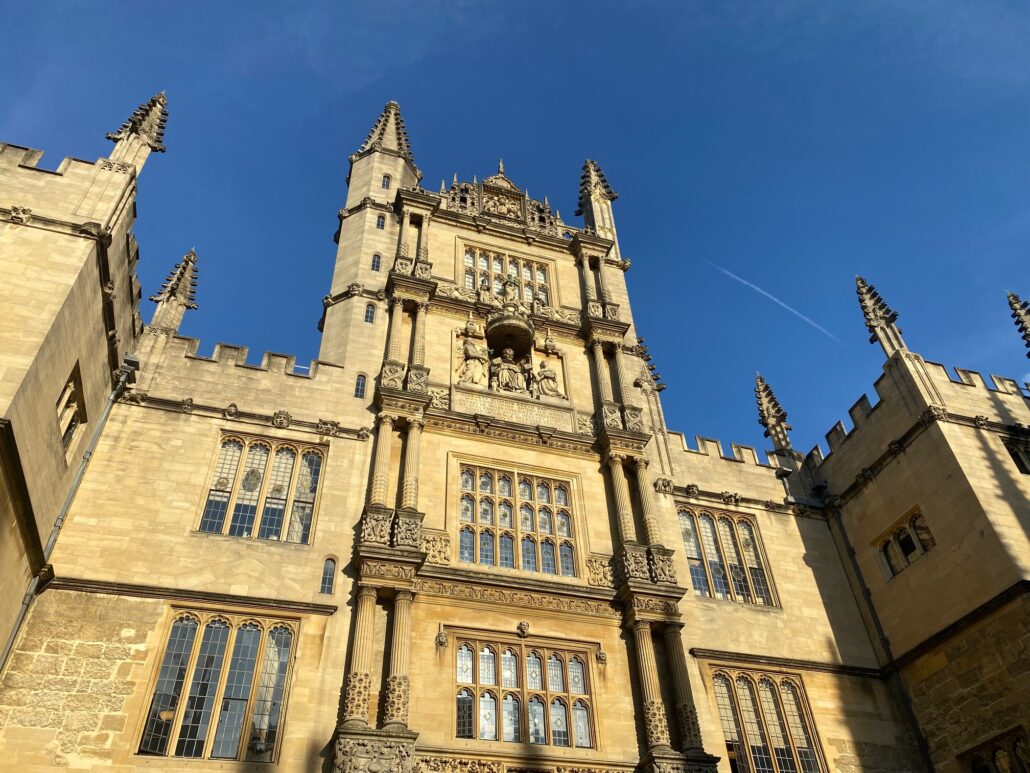
We are delighted to partner with the Bodleian Libraries, University of Oxford and the Polish Cultural Institute in London to announce Queen Jadwiga Fellowship in Polish Studies.
The Queen Jadwiga Fellowship in Polish Studies supports a research visit of one University of Oxford term (or for a shorter stay of at least one month), for research in Polish studies. Applicants are invited to submit research topics related to any aspect of Polish culture and history which can be supported with reference to the collections of the Bodleian Libraries, including the Taylorian Library. The Libraries would particularly welcome applications which draw upon resources not readily available elsewhere.
Relevant collections connected with the history and culture of Poland include, for example, but not exclusively, medieval manuscripts, early modern documents, maps and letters, modern archives and the ‘Libri Polonici’ special collection of printed books, mostly of the 16th century. Polish studies at the University of Oxford are represented in the Faculty of Medieval and Modern Languages and in the Faculty of Modern History.
Deadline for the applications is the 1st of December 2023.
Read more and apply at:
https://www.bodleian.ox.ac.uk/csb/fellowships/bodleian-visiting-fellowships
Stitching our Stories with the Women Weavers of Mampuján
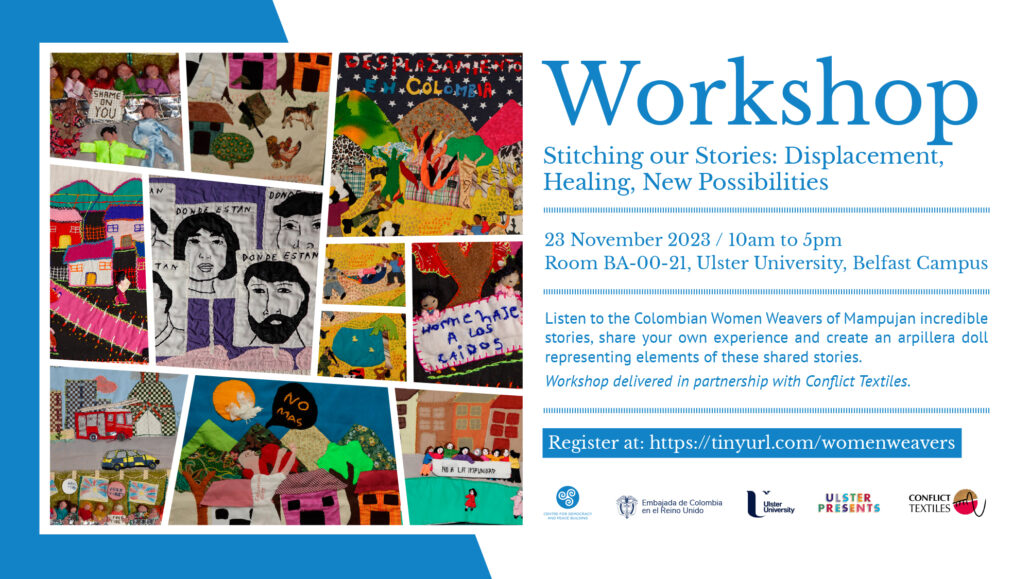
CDPB is delighted to partner with the Colombian Embassy in the UK, Ulster University and Conflict Textiles to host a workshop on the occasion of the Women Weavers of Mampuján visit to Belfast this November. The new Colombian Ambassador to the UK HE Roy Barreras Montealegre will also be visiting NI to meet with the political, community and business representatives and to deliver a lecture at Ulster University.
At the heart of the workshop are the Women Weavers of Dreams and Flavours of Peace of Mampuján. Hailing from the war-torn region of Montes de Maria in Colombia, this group of displaced women turned to the art of tapestry as a means of healing and storytelling. Rather than conventional quilts, they sewed their stories onto large tapestries drawing on Afro-Caribbean storytelling and local textile art traditions, vividly depicting the atrocities they endured as a community and their displacement experiences. The women credit the process with being central to their process of healing and re-building, enabling them to come together and to share their pain, to commemorate and to start looking forward.
The Stitching our Stories: Displacement, Healing, New Possibilities workshop, facilitated by Breege Doherty and Eva Gonzalez of Conflict Textiles, will take place on Thursday, 23rd November at Ulster University’s Belfast Campus.
The event organised in partnership with Conflict Textiles and Ulster Presents promises to be a celebration of resilience, creativity, and shared narratives. It is free of charge, and you can sign up via the Eventbrite link below. Lunch and refreshments will be provided.
The workshop aims to facilitate the sharing of stories, emphasising themes of conflict, displacement, healing, individual and collective navigation of these challenges, and the opportunities they now pursue in a rapidly changing world. Additionally, attendees will have the privilege of hearing the Women Weavers of Mampuján recount their journey of establishing the Museum of Art and Memory in Mampuján, shedding light on the power of art and memory in reconciliation. Participants will also engage in a creative exercise, crafting arpillera dolls representing elements of these shared stories, with the final creations set to be presented at the Colombian Ambassador to the UK’s lecture at Ulster University.
Overall, the workshop promises to be a poignant exploration of art, memory, and the resilience of women from diverse corners of the world.
Stitching our Stories: Displacement, Healing, New Possibilities
Thursday, 23rd November | 10am to 5pm
Room BA-00-21, Ulster University, Belfast Campus
Register at: https://tinyurl.com/womenweavers
New Belfast/Good Friday Agreement online course launched
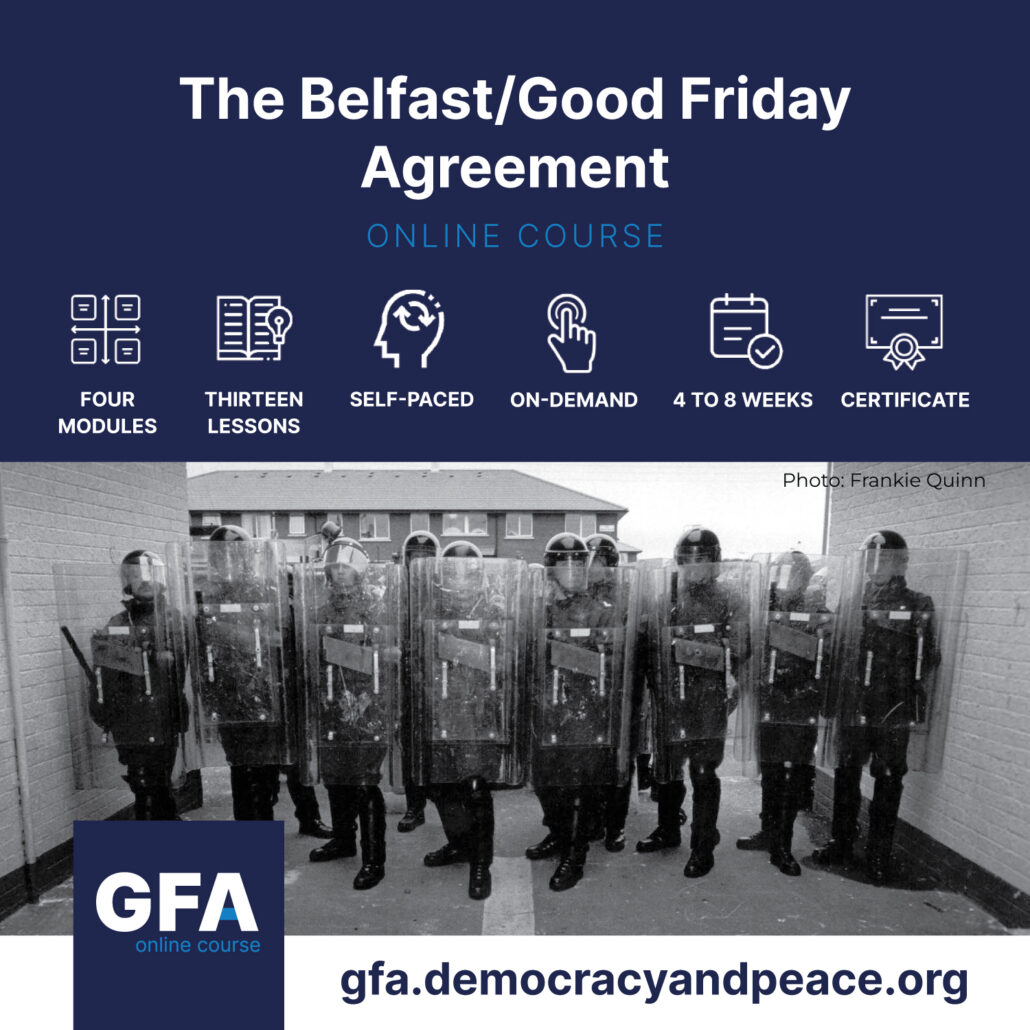
To mark the International Day of Peace, CDPB has launched a brand-new online interactive course on the Belfast/Good Friday Agreement. Designed for educating a global audience on Northern Ireland’s peace process, the course is open to anyone interested in British-Irish history and the Good Friday Agreement.
With support from Dormant Accounts NI and developed by renowned journalist and broadcaster Mark Devenport, photographer Frankie Quinn, and with academic input from Professor Peter Shirlow of the Institute of Irish Studies, University of Liverpool, the interactive course takes participants on a journey through Northern Ireland’s peace process, exploring the Agreement’s historical context, with particular focus on the Troubles, the negotiation process from which it emerged as well as the successes, failures, and lessons of the Agreement, twenty-five years on from this landmark moment in British-Irish history.
The course will also be offered for free to the Asian University for Women, representing 17 different nationalities and including a cohort of Afghani women.
The Belfast/Good Friday Agreement online course aims to enlighten and inspire peacebuilders from across the world as a notable example for political and social progress.
More information about the Belfast/Good Friday Agreement online course can be found here: https://gfa.democracyandpeace.org/
Mark Devenport, broadcaster and political commentator, said:
“The Belfast/Good Friday Agreement is not just a historical document to be studied, it is a living testament to the power of diplomacy and conflict resolution, and its lessons remain profoundly relevant for today’s world. Looking back over the 25 years since the Belfast/Good Friday Agreement was signed, I am reminded of the beacon of peace and reconciliation that it is in British-Irish history. I trust that this online course, curated for the benefit of a diverse range of people from all walks of life, will be accessible and helpful in explaining the complexities of the history of this place and the dynamics of peacebuilding”.
Kamal Ahmad, Founder, Asian University for Women, added:
“I am so pleased that this course is being offered to our students at the Asian University for Women. Our institution’s mission is to educate and empower a diverse community of women, welcoming students from all backgrounds. Given that many of our students can relate to the experiences of conflict in Northern Ireland, offering them the opportunity to study a successful peace process, despite its challenges and imperfections, is truly inspiring. I am certain that learning about the Belfast/Good Friday Agreement will imbue our future leaders with optimism and hope for a bright future”.
Baroness Margaret Ritchie, Chair, Centre for Democracy and Peace Building, said:
“With the launch of the Belfast/Good Friday Agreement online course, the Centre for Democracy and Peace Building has opened a gateway to history for many individuals across the world, offering a transformative educational journey which transcends borders. By extending knowledge and fostering understanding, it is my hope that this course will empower a global community of peacemakers by drawing on Northern Ireland’s experience as a prime example of progress and reconciliation”.

